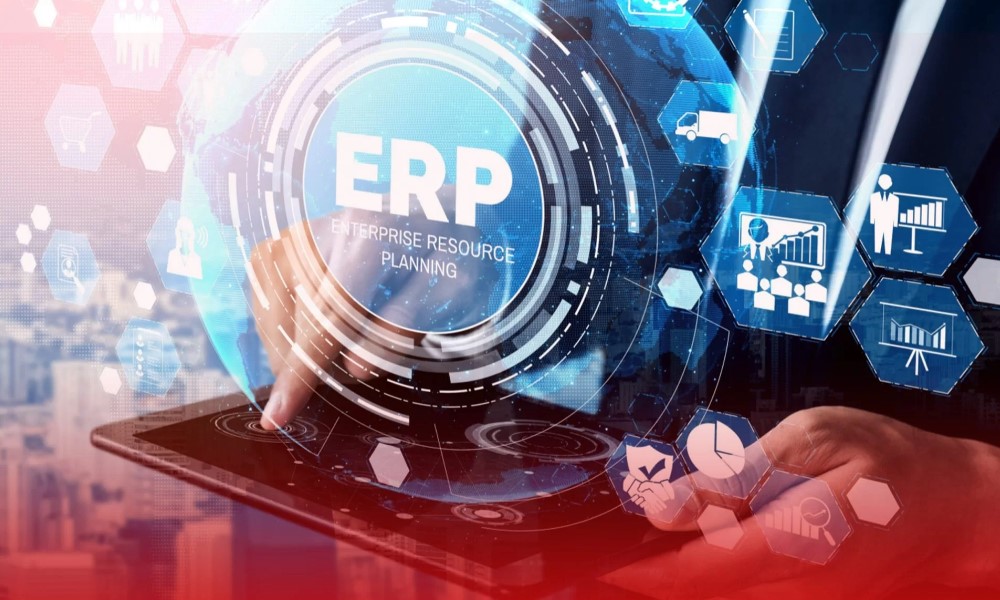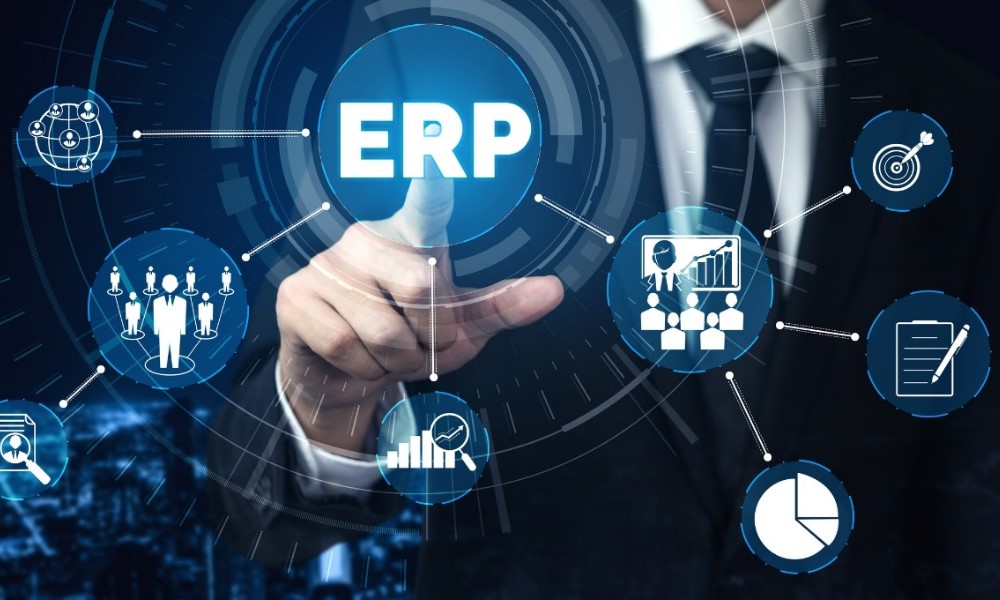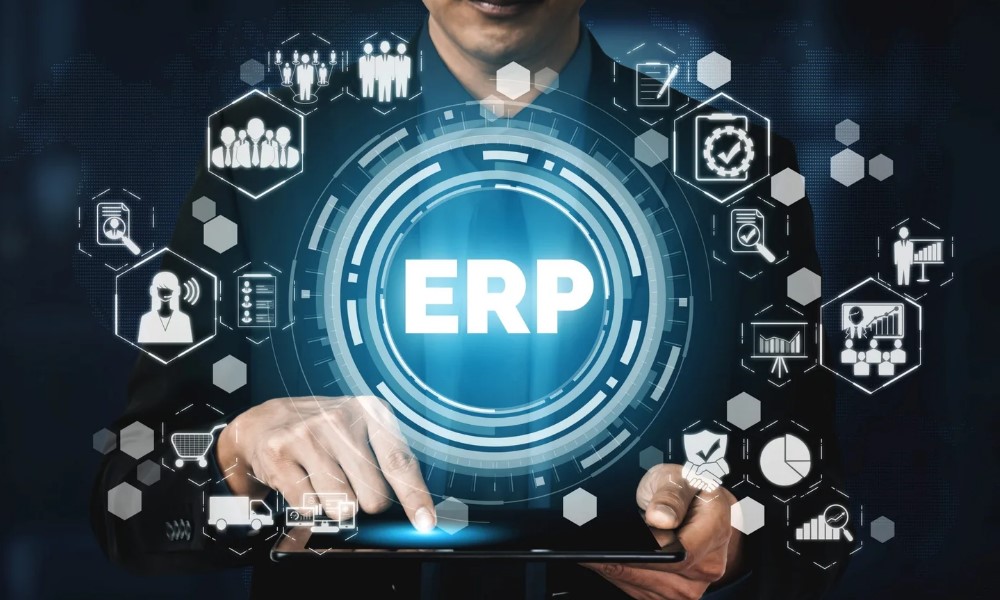Top ERP Software Solutions for Small Businesses in 2024
For small businesses, efficiency and adaptability are essential for survival in today’s fast-paced market. However, managing various processes like accounting, inventory, human resources, and customer relationships manually can create unnecessary bottlenecks and reduce productivity. This is where Enterprise Resource Planning (ERP) software comes into play. ERP software unifies these essential business functions into a single, integrated system, providing small businesses with the tools they need to streamline operations, minimize errors, and gain real-time insights into their performance. In this article, we’ll delve into the most beneficial ERP solutions for small businesses, explore their features, provide real-world examples, and offer guidance on making an informed purchasing decision.
What is ERP Software and Why is it Vital for Small Businesses?

ERP software consolidates various business processes into a single system, allowing different departments to access shared data and automate repetitive tasks. This creates a streamlined flow of information across the company, leading to increased operational efficiency, improved data accuracy, and better decision-making. For small businesses, ERP software enables them to operate with the agility and coordination typically seen in larger enterprises, making them more competitive in their respective industries.
By centralizing essential business functions, ERP software also reduces the need for multiple standalone systems, leading to cost savings and a more organized approach to data management. The ability to view all business processes in one unified system allows small businesses to quickly identify areas for improvement, monitor key performance indicators (KPIs), and react to changes in the market.
Types of ERP Software for Small Businesses

On-Premise ERP Software
On-premise ERP software is hosted directly on a business’s own servers and managed by its internal IT team. This type of ERP system allows businesses to fully control their data and customize the software according to their unique requirements. Although the initial cost for hardware and setup can be higher than other options, on-premise ERP is often a good long-term investment for companies that prioritize data security and extensive customization. It provides stability and reduces reliance on internet connectivity, making it a strong choice for businesses with consistent, in-house IT support.
Cloud-Based ERP Software
Cloud-based ERP software, hosted on external servers and accessible via the internet, is popular for its affordability and scalability. Small businesses benefit from cloud ERP due to its lower upfront costs and reduced need for physical hardware. This ERP type allows users to access the system from any internet-enabled device, making it convenient for teams working remotely or on the go. Regular updates and maintenance are handled by the provider, which reduces the need for in-house IT management. Cloud ERP is ideal for small businesses looking for flexibility and minimal technical upkeep.
Hybrid ERP Software
Hybrid ERP combines elements of both on-premise and cloud-based ERP systems, allowing businesses to enjoy the best of both worlds. With hybrid ERP, certain critical data and applications can be hosted on-premise, while other modules are hosted in the cloud. This approach offers a flexible and adaptable solution, enabling small businesses to maintain control over sensitive information while benefiting from the accessibility and cost-effectiveness of cloud features. Hybrid ERP is especially suitable for businesses with varying needs or those seeking a gradual transition to the cloud.
Industry-Specific ERP Software
Industry-specific ERP software is tailored to meet the specialized requirements of particular sectors, such as manufacturing, retail, healthcare, or construction. These ERP solutions offer features and modules specifically designed to handle industry-specific processes, like inventory control for retail or compliance tracking for healthcare. For small businesses operating in niche markets, industry-specific ERP software can streamline workflows and enhance efficiency by offering tools that align closely with their operational needs. This type of ERP system is ideal for businesses seeking functionality that is already fine-tuned to their sector.
Best Features ERP Software for Small Businesses

ERP (Enterprise Resource Planning) software provides small businesses with powerful tools to streamline operations, improve productivity, and make data-driven decisions. Here’s a look at some of the best features ERP systems offer for small businesses, helping them manage everything from inventory to customer relations efficiently.
- Integrated Financial Management: ERP systems consolidate financial processes, offering small businesses a real-time view of their financial health. This feature integrates accounting, budgeting, and forecasting, making it easier for businesses to track cash flow, monitor expenses, and ensure compliance.
- Inventory and Supply Chain Management: One of the standout features of ERP software is its ability to manage inventory effectively. ERP systems provide real-time insights into inventory levels, automate reorder points, and help prevent overstock or stockouts. For small businesses, this capability reduces waste and ensures that resources are optimized.
- Customer Relationship Management (CRM): ERP software often includes CRM capabilities, enabling businesses to manage customer interactions, track sales, and improve service. With centralized customer data, small businesses can deliver personalized experiences, respond quickly to customer needs, and strengthen customer loyalty.
- Human Resource Management (HRM): ERP software simplifies HR functions by automating tasks like payroll, employee records, and performance tracking. This feature helps small businesses manage their workforce efficiently and ensures compliance with HR regulations.
- Data Analytics and Reporting: With built-in analytics and reporting tools, ERP systems enable small businesses to generate detailed reports and gain insights into business performance. This data-driven approach supports better decision-making, helping businesses identify trends and opportunities for growth.
Benefits of ERP Software for Small Businesses
Implementing ERP software brings transformative benefits to small businesses. Here’s an in-depth look at how ERP systems can drive growth and operational efficiency:
- Streamlined Business Processes: ERP systems integrate various business functions—like finance, inventory, sales, and HR—into one platform, which creates seamless workflows across departments. This reduces redundancy, eliminates bottlenecks, and enables employees to focus on more strategic tasks.
- Enhanced Data Accuracy and Accessibility: A unified ERP system provides a single source of truth for all business data. This eliminates discrepancies that arise when different departments use separate software and allows for more accurate and timely information. Managers and employees can access real-time data, leading to more consistent decision-making and better collaboration.
- Improved Scalability: As your business grows, so do its needs. ERP systems are designed to scale, allowing you to add new features or expand capacity without disrupting existing processes. This makes ERP software a long-term investment that can adapt as your business evolves.
- Cost Savings and Increased Profitability: By automating repetitive tasks, reducing manual errors, and improving overall efficiency, ERP software can significantly reduce operational costs. Improved productivity and streamlined processes contribute to higher profitability, making ERP a worthwhile investment for small businesses.
- Better Customer Relationship Management (CRM): ERP systems often include CRM modules that help businesses manage customer interactions, track sales, and respond to customer needs. This enables small businesses to offer more personalized customer service and improves customer satisfaction and loyalty.
- Regulatory Compliance and Risk Management: Many ERP systems have built-in compliance features that help businesses adhere to industry regulations and standards. Additionally, centralized data and reporting capabilities make it easier to conduct audits, manage risks, and ensure the integrity of business operations.
Top ERP Software Products for Small Businesses

Selecting an ERP solution involves understanding the unique needs of your business and assessing the features, benefits, and costs of different options. Below are three top ERP software products, each tailored to small businesses with diverse needs.
1. SAP Business One
- Overview: SAP Business One is a powerful ERP solution specifically designed for small and medium-sized businesses. It provides end-to-end functionality for financial management, inventory control, sales, and analytics, making it ideal for data-driven companies looking to gain insights from their operations.
- Key Features:
- Financial Management
- Sales and Customer Management
- Inventory Control
- Advanced Reporting and Analytics
- Pros:
- Highly customizable, allowing small businesses to tailor the software to their unique processes.
- Robust analytics tools for data-driven decision-making.
- Cons:
- Higher upfront cost compared to other ERP systems.
- Complex implementation that may require professional support.
- Price: SAP Business One pricing begins at approximately $3,000 per user, with additional costs for implementation and customization based on the business’s specific needs.
- Where to Buy: SAP Business One Official Website
2. NetSuite ERP by Oracle
- Overview: NetSuite ERP is a cloud-based solution that consolidates financials, CRM, inventory, and order management into a single platform. With a highly scalable structure, NetSuite ERP is particularly suited for small businesses aiming for growth and future scalability.
- Key Features:
- Financial Planning and Revenue Management
- Billing, Invoicing, and Order Management
- Inventory and Supply Chain Management
- Real-Time Analytics and Reporting
- Pros:
- Scalable platform designed for growing businesses.
- Advanced reporting features and real-time visibility into business performance.
- Cons:
- Higher initial investment, making it more costly upfront.
- Requires time for customization and employee training.
- Price: Annual subscription plans start at around $10,000, with variations based on customization and user count.
- Where to Buy: Oracle NetSuite ERP Official Website
3. Odoo ERP
- Overview: Odoo is an open-source ERP solution known for its affordability and flexibility. It offers a range of modules—covering CRM, sales, project management, inventory, and HR—that can be customized to meet various business needs. This makes Odoo ideal for small businesses looking for a cost-effective solution with high adaptability.
- Key Features:
- Customizable CRM and Sales Management
- Inventory Tracking and Order Management
- HR Management and Project Management
- Flexible and Open-Source Architecture
- Pros:
- Highly affordable, with a free version available for basic needs.
- Modular design allows businesses to pay for only the features they need.
- Cons:
- Initial setup and customization may require technical assistance.
- Customer support options are limited for the free version.
- Price: Basic modules are free, with additional premium features available for a fee.
- Where to Buy: Odoo ERP Official Website
In-Depth Comparison of ERP Solutions
When evaluating ERP options, it’s essential to consider your business’s unique requirements, budget, and growth goals. Here’s a more detailed comparison of the three ERP systems discussed:
Best Use Cases
- SAP Business One is a suitable choice for small businesses that require detailed analytics and reporting tools to make data-driven decisions.
- NetSuite ERP is a robust solution for businesses expecting rapid growth, offering features that can support an expanding operation.
- Odoo ERP is perfect for budget-conscious startups or small businesses seeking a flexible, cost-effective solution with basic customization.
Pros and Cons Summary
- SAP Business One: Offers powerful analytics and customizable features but requires a significant initial investment and may need professional assistance for implementation.
- NetSuite ERP: Known for scalability and comprehensive reporting, though it has a higher upfront cost and a longer onboarding process.
- Odoo ERP: The most affordable option with flexibility, though technical setup can be challenging, and support is limited for the free version.
Detailed Benefits of ERP Software for Business Operations
ERP software can transform various aspects of a small business. Here are some of the specific ways ERP systems support business growth and efficiency:
- Financial Management and Forecasting: ERP software allows businesses to track financial data, create accurate forecasts, and manage cash flow efficiently. With real-time data, businesses can monitor expenses, revenues, and profitability, which helps in making strategic financial decisions.
- Inventory Control and Supply Chain Management: ERP systems enable small businesses to monitor inventory levels, optimize stock, and streamline the ordering process. By automating supply chain activities, ERP software helps businesses avoid stockouts, minimize overstock, and keep operational costs low.
- Sales and CRM Integration: ERP systems with CRM capabilities allow small businesses to maintain customer records, track interactions, and build stronger customer relationships. This supports customer retention and improves sales performance.
- Regulatory Compliance and Reporting: ERP systems help businesses comply with regulatory requirements by providing accurate, traceable data. Businesses can generate detailed reports, conduct audits, and ensure adherence to industry standards more easily.
How to Buy ERP Software: A Step-by-Step Guide
Choosing and purchasing the right ERP software involves a few essential steps to ensure it aligns with your business needs:
Step 1: Identify Your Business Requirements
Start by listing the specific processes that an ERP system should manage. This might include inventory, CRM, accounting, or employee management.
Step 2: Compare Features, Costs, and Value
Look closely at the pricing models of different ERP solutions, and assess the value they provide in terms of features and scalability.
Step 3: Purchase from Authorized Providers
Make sure to buy directly from trusted sources. For example:
- SAP Business One Official Website
- Oracle NetSuite ERP Official Website
- Odoo ERP Official Website
Step 4: Plan for Implementation and Training
Some ERP systems may require professional assistance for setup and customization, so consider budgeting for these services if necessary.
FAQs
1. What is ERP software, and how can it help small businesses?
ERP software integrates multiple business functions into a single system, improving efficiency, data accuracy, and decision-making abilities for small businesses.
2. What factors should small businesses consider when choosing ERP software?
Consider your business’s specific needs, scalability, budget, and the features offered by different ERP solutions.
3. How can ERP software improve customer service?
ERP software often includes CRM features that enable businesses to track customer interactions, respond quickly to inquiries, and offer personalized experiences, ultimately boosting customer satisfaction.